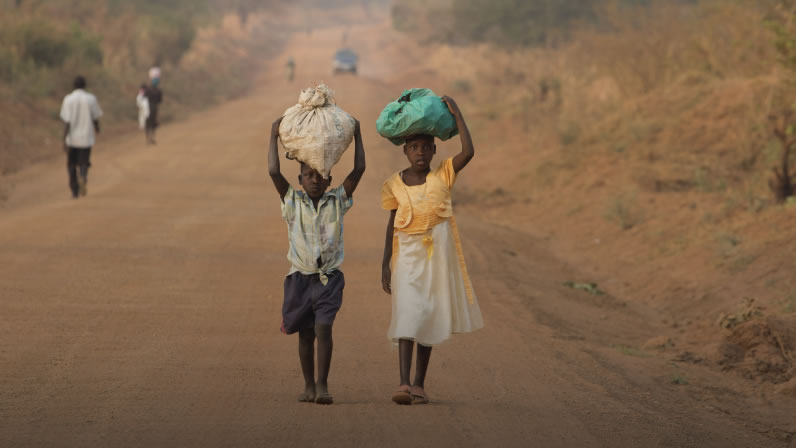We must not abandon Africa: Tim Costello
Monday, June 20, 2016

World Vision chief executive Tim Costello has called on the Australian Government to restore aid funding to Africa with the United Nations warning of large-scale food shortages across southern Africa by next month, fears that almost 50 million people will need food aid by Christmas, and the looming closure of the world’s largest refugee camp.
Australian aid to Sub-Saharan Africa has been slashed by 70 per cent as part of $11 billion in aid cuts by the Coalition Government over the past three years.
On the eve of World Refugee Day, June 20, Mr Costello said Africa was now confronting its worst food crisis since 1985, with almost 2.7 million children already suffering acute malnutrition.
In addition, Kenya has announced it will close the world’s largest refugee camp, Dadaab, casting more than 300,000 people into an uncertain future.
“When Australia cut its aid budget to Africa by 70 per cent we turned our backs on some of the poorest people on Earth,” Mr Costello said.
“But Africa is now asking for help to avert a humanitarian crisis and we must do what we can.”
Mr Costello said three major events were set to stretch already frayed humanitarian resources: the ongoing impacts of one of the strongest El Nino in 50 years, which has produced widespread drought, floods, hunger and food shortages; the closure of Dadaab, affecting 327,000 people – including 192,000 children; and an ever-worsening crisis in Syria.
The UN has warned that food will start running out on a large scale in southern Africa by next month, while the World Food Programme predicts that by Christmas, 50 million people will need food support, with tens of millions more facing food and water shortages in Asia, Latin America and the Pacific regions. The Southern African Development Community said this week that 2.7 million children were already suffering from acute severe malnutrition.
In Syria, 13.5 million people are in need of humanitarian assistance, more than 11 million have been forced from their homes, and almost 5 million have fled as refugees. Yet, UN calls for international aid have been consistently underfunded. The UN’s Syria humanitarian response plan for 2016 is only 23 per cent funded.
For the past 25 years, Dadaab, located near the Kenya-Somalia border, has provided refuge for hundreds of thousands of people, many fleeing civil war, lawlessness and recurrent droughts in Somalia. But in April, Kenya said that it would close the sprawling camp, saying it was being used as a launching pad for terrorism by radical group Al-Shabaab.
While the governments of Kenya and Somalia have promised the repatriation will be orderly, dignified and humane, conditions in Somalia remain fraught.
The UN regards political progress in Somalia as “real, but reversible”, more than 1 million people are internally displaced and nearly 2 million people are affected by severe drought.
World Vision’s regional director for East Africa, Margaret Schuler, said: “The Kenyan government, like Middle Eastern governments responding to the Syrian refugee crisis, have been struggling to meet the needs of hundreds of thousands of people in need.
“It’s time for the world to accept the refugee challenge won’t go away.
“We must collectively do more to address the root causes driving migration and ensure refugees are not marginalised, or left unproductive for years in camps. Children must be given education. Adults must have work opportunities. These things restore dignity and reduce reliance on expensive and unsustainable aid hand-outs.”
Francois Batalingaya, Director of Humanitarian Operations for World Vision warned: “The pressures on very vulnerable people to migrate from extreme hardship and conflict are, if anything worsening. We urgently need to do much more to help refugees - and especially children – by courageously addressing the underlying causes that lead to mass movements of people.”
World Vision is calling for the rapid implementation by governments and humanitarian players of recent commitments made at the World Humanitarian Summit. These include doing much more to:
• Ensure no child misses out on education by guaranteeing schooling for all - and funding it
• Proactively find political solutions to prevent and end conflict, which drives 80 per cent of humanitarian need globally
• Permit refugees to work within host communities and provide business support so they can look after themselves and their families
• Target countries prone to conflict, chaos and crises with long-term development programming and financing that bring lasting change at the local level.
Tim Costello is available for interview
Contact Stuart Rintoul: 0407-241492
Media Releases,
Africa,
Latin America and Carribean,
Middle East, Eastern Europe & Central Asia,
Climate Change,
Drought,
Refugee Crisis
Back to all Results